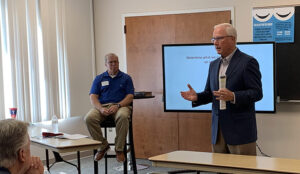By David Roach
B&R Contributing Writer

At a Sept. 17 seminar, TBC president Bruce Chesser offered numerous suggestions for adapting church ministry to pandemic conditions. Looking on is Bruce Raley, FBC executive pastor.
— Photo by David Roach
HENDERSONVILLE — When Tennessee Gov. Bill Lee asked churches March 13 not to meet in person, leaders at First Baptist Church in Hendersonville thought they would have to suspend normal worship services two or three weeks, until Easter at the latest. When those plans didn’t materialize, they figured everything would be back to normal by the start of school. That didn’t materialize either.
Today, the church is still more than 40 percent below its pre-pandemic worship attendance of 3,750 and doesn’t know when — if ever — things will get back to normal. Yet God is at work. The church baptized 51 people on a single Sunday in August.
Pastor Bruce Chesser, who serves as Tennessee Baptist Convention president, says he is learning to minister despite the constantly shifting new reality, and he wants to help other church leaders do the same. At a Sept. 17 seminar, he and First Baptist executive pastor Bruce Raley told 42 Tennessee Baptists to plan for COVID-19 to alter their ministry strategy for the next 12-18 months.
“We’ve got to be in a period of reorganization,” Chesser said, “because the church that you and I were trained to minister in doesn’t exist anymore. I’m not saying it won’t ever exist,” but “it doesn’t exist at this moment.”
The seminar, titled “Navigating the Next 12 to 18 Months,” included suggestions for maintaining a church’s mission and purpose while adjusting the logistics of its evangelism, discipleship, worship and money management in the era of limited gatherings and social distancing.
Bert Spann, pastor of First Baptist Church in Hohenwald, said the seminar infused his ministry planning with “some creative juices.”
“Everybody’s affected” by COVID, Spann said. “I don’t have time or energy to reinvent the wheel, and I want to hear what other people are doing to effectively do ministry.”
Churches with more than 200 members generally have rebounded to 50 percent or less of their pre-pandemic attendance, Raley said. The figure rises to about 75 percent for churches of fewer than 200. The reduced attendance could continue for months, given projections a COVID-19 vaccine may not be distributed widely until mid-2021.
The question for churches, Chesser and Raley said, is whether they can adjust to a new baseline attendance and find creative ways to grow again.
“We’re in a period of time that demands rapid, decisive action,” Raley said. “And we have to make some tough calls without full knowledge.”
Rekindling a church’s mission and establishing core values for pandemic ministry are key steps, Raley said. First Hendersonville’s pandemic core values are focusing on “people over tasks,” determining what the church can do rather than what it cannot do and redirecting ministry rather than reducing it. When coronavirus forced cancelation of major ministry events like Vacation Bible School and the Christmas adult choir program, First Baptist examined the purpose of those events and designed alternatives that account for social distancing and other COVID-19 restrictions.
That meant replacing VBS with backyard Bible clubs. For holiday music, the church has purchased TV time to broadcast its adult choir program in Nashville on Christmas Eve and Christmas Day, increasing its normal audience of thousands to hundreds of thousands.
Financial planning is of particular importance over the next year, Raley said. Church giving generally has remained strong to date, but giving trends tend to follow attendance trends, leaving him “not worried, but cautious.”
Stewardship emphasis and expense control both should be priorities in the coming months, Raley said. Telling stories of giving’s positive effects can encourage generosity, he said. On the expense control side, he has “never found a budget you can’t tweak 5 percent” by eliminating nonessentials — like custom t-shirts for church events at First Baptist.
Chesser and Raley made dozens of suggestions for adjusting other key ministry areas, noting not all ideas will work for all churches. Among their suggestions:
- To emphasize evangelism, encourage church members to post their testimonies on social media; hold an outdoor lake or river baptism service; challenge church members to get to know their neighbors; conduct a new member orientation via Zoom; and offer people a way to respond to invitations during worship services via text message.
- To emphasize discipleship, offer a variety of small group options, including online groups, hybrid in-person/online groups, weekday groups, weeknight groups and Sunday groups; start new groups with 5-7 people and aim to grow them to 10; and launch a coordinated Bible reading plan for the whole church.
- To emphasize worship, launch an online campus to supplement in-person worship; ask people to reserve specific seats online for Christmas and Easter services to avoid overcrowding; baptize only one person or family group per service to allow social distancing and chlorination of the water between services; and use prepackaged Lord’s Supper elements that people pick up on their way into the service.
Chesser and Raley will present the seminar free of charge for any association or region of the state that requests it.
